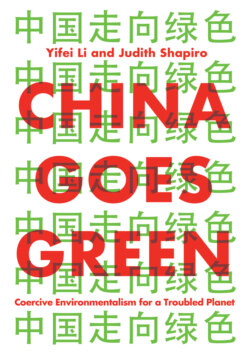Читать книгу China Goes Green - Judith Shapiro - Страница 11
Authoritarianism in Green Clothing
ОглавлениеOur analysis seeks to articulate not only the environmental implications of the Chinese green state, but also many of the non-environmental consequences of authoritarian environmentalism. Given that China is now one of the world’s superpowers, this is a matter of enormous significance. The non-environmental spillover effects of Chinese environmental governance have been recognized: there are human rights consequences of big dam construction; nomads are sedentarized in the name of grasslands preservation; ordinary people in big cities complain that the state is invading their privacy by specifying their laundry techniques and investigating their garbage disposal practices. Building on this line of inquiry, we wish to evaluate more systematically the many intended and unintended consequences of coercive environmental measures adopted by the state. A truly effective model of governance in the Anthropocene cannot afford to ignore the non-environmental implications of environmental pursuits. Therefore, we examine the promise of China’s state-led approach along both environmental and non-environmental lines.
Our study reveals that there are admirable elements in the decisiveness of Communist Party policy makers on environmental issues, but there is also much to fear. Notable achievements have been made in sectors from renewable energy to the restoration of ecosystem services. At the same time, the crackdowns, targets, and technological surveillance tools used to implement environmental protection are also being used to assert and consolidate the hand of the state over the individual and over citizens’ groups. We find that there is much to learn from China’s determination to resolve its massive environmental problems, but we also caution strongly against the darker consequences of China’s style of state-led environmentalism. Not only are individual and social freedoms sharply curtailed by China’s approach but even the environmental successes are not always what they seem.
A preview of our main argument is in order. We set out to investigate the emergence of a new kind of environmentalism: a state-led, coercive, authoritarian style of environmental governance. What our investigation yields, however, is not a new environmental paradigm but an emerging political strategy to fold environmental concerns into the concatenation of the techno-political interests of the Chinese state. Building on prior studies that examine the broader, non-environmental implications of China’s decisive moves in this arena, we try to provide a systematic portrait of “green” China’s methodologies. As we follow the sprawling scope of Chinese environmental power from its industrial East to outer space, we discover a coordinated effort to align environmental interventions with the state’s ambitious political agenda. This alignment has led to the wholesale subsuming of environmental goals and interests to the supreme leadership of the Chinese state. In the name of ecological wellbeing, the state exploits the environment as a new form of political capital, harnessing it in the pursuit of authoritarian resilience and durability. In this process, some environmental conditions such as urban air quality have seen marked improvement, but others such as desertification and deforestation have been made even worse.
These observations lead us to question the accuracy of the term “authoritarian environmentalism” for describing the empirical reality of contemporary China. The term suggests that authoritarianism is merely a vehicle in service of the honorable goal of sustainability. Thus, it implies an instrumental view of politics: the end justifies the means. Its use invites a leap of faith toward accepting authoritarian politics on environmental grounds. As readers will see, however, the cases in this book suggest an inverted picture, whereby authoritarianism is the end and environmentalism is the means. In some cases, there has been a measure of environmental success. In others, the environmental achievements are elusive, if not dubious. Common to all, however, is the intense consolidation of political and epistemic power in the hands of the Chinese state. In this light, a more accurate term than “authoritarian environmentalism” is “environmental authoritarianism.” This formulation is more consistent with the empirical evidence presented in this book.
